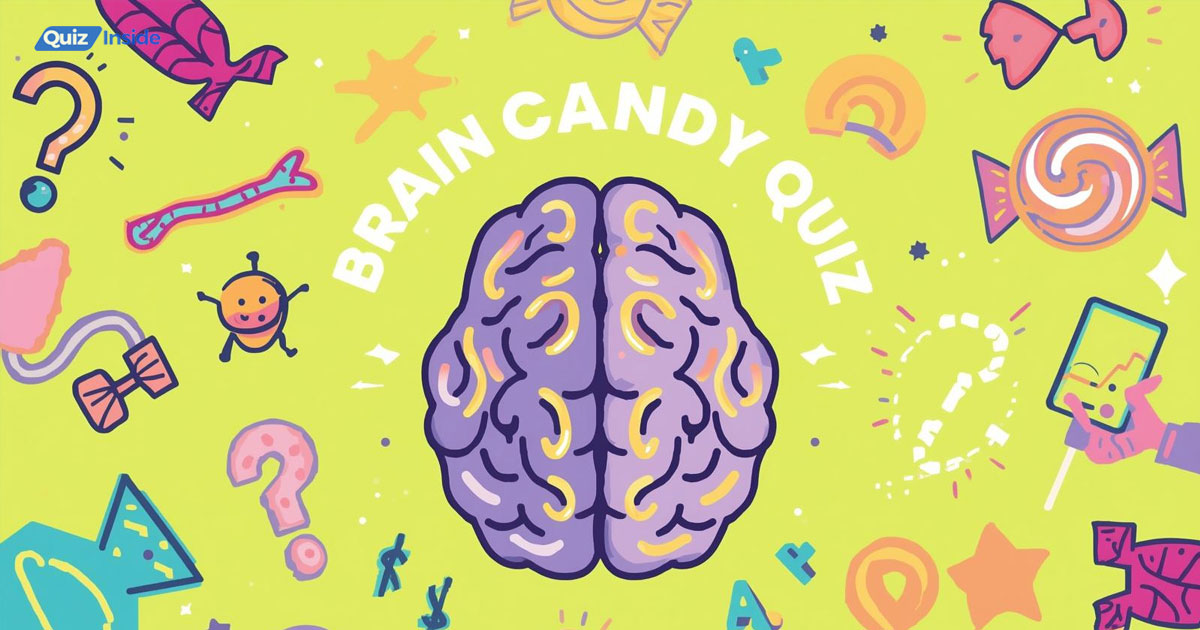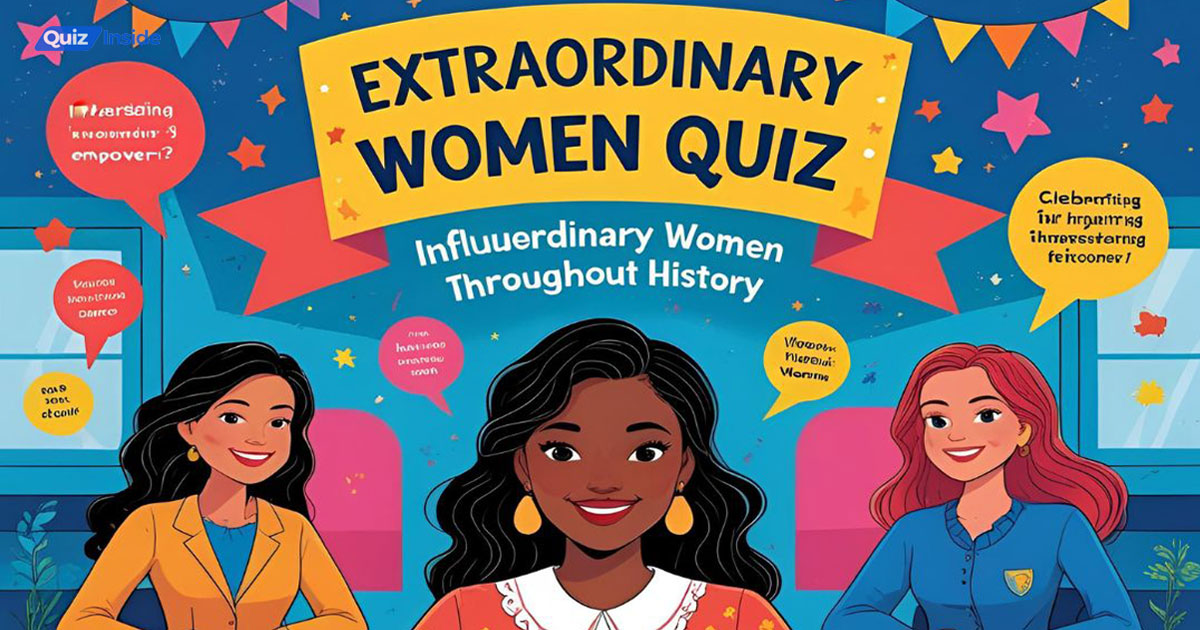A brain candy quiz is a fun, lighthearted way to challenge your mind with trivia, riddles, and puzzles that are both entertaining and intellectually stimulating.
Play the Brain Candy Quiz to challenge your knowledge, boost memory, and enjoy fun trivia across science, history, sports, and pop culture.
Results
Congratulations, You Passed the Quiz! 🎉
Great job! Your sharp thinking and quick answers show just how much brain power you’ve got. Keep challenging yourself with more Brain Candy Quizzes to stay sharp, learn new facts, and have fun along the way. Ready for the next round? 🚀
Oops, You Didn’t Pass This Time 😅
Don’t worry—every great mind learns from mistakes! This was just one step toward sharpening your knowledge. Try again, challenge yourself, and you’ll be amazed at how much you improve. Ready to give it another shot? 💡✨
#1. Which organ in the human body is responsible for controlling thoughts, memory, and emotions?
#2. What part of the brain is responsible for balance and coordination?
#3. Which chemical in the brain is often called the “feel-good hormone”?
#4. What percentage of the human brain is made up of water?
#5. Which part of the brain regulates breathing and heartbeat?
#6. What is the average weight of an adult human brain?
#7. Which side of the brain is more associated with creativity and imagination?
#8. The hippocampus is mainly responsible for which brain function?
#9. Which of the following foods is often considered “brain food” because it supports memory and focus?
#10. Which vitamin is crucial for proper brain function and energy?
#11. Which sleep stage is most important for memory consolidation?
#12. Which part of the brain is known as the “emotional center”?
#13. How many nerve cells (neurons) are estimated to be in the human brain?
#14. What natural activity helps improve brain plasticity and memory?
#15. Which of these is considered the best exercise for both body and brain health?
In today’s fast-paced world, our brains are constantly processing information, but how often do we give them a fun, no-pressure workout? That’s where the concept of a brain candy quiz comes in. It’s not about high-stakes exams or proving your intelligence; it’s about savoring bite-sized pieces of knowledge and trivia, much like enjoying a piece of your favorite candy. These quizzes are designed to be enjoyable, engaging, and a fantastic way to refresh your mind and learn something new without even realizing it. They can cover anything from pop culture and history to science and literature, making them universally appealing.
What Exactly Is a Brain Candy Quiz?

At its core, a brain candy quiz is a collection of trivia questions, riddles, and puzzles crafted to be a delightful mental treat. The term “brain candy” perfectly captures the essence of these quizzes: they are sweet, easy to consume, and leave you feeling satisfied and a little smarter. Unlike traditional quizzes that might focus on a single subject, brain candy quizzes often jump between topics, keeping your brain on its toes. This variety is what makes them so addictive and effective at stimulating different parts of your mind.
The questions are usually designed to be accessible to a wide audience. You don’t need to be an expert in a specific field to answer them. Instead, they often tap into common knowledge, lateral thinking, and general curiosity. Think of questions like, “What is the capital of Australia?” or “In which year did the first iPhone come out?” These aren’t questions you typically study for, but they are facts that many people encounter in their daily lives.
Why Are Brain Candy Quizzes So Popular?
The immense popularity of these quizzes stems from their simple yet powerful appeal. In a world saturated with complex information, they offer a low-stakes, high-reward form of entertainment.
The Science of “Aha!” Moments
Neuroscience tells us that solving a problem or answering a trivia question correctly releases a small burst of dopamine, a neurotransmitter associated with pleasure and reward. This is the same chemical reaction that makes video games and social media so compelling. A brain candy quiz provides a steady stream of these small victories, creating a positive feedback loop that encourages you to keep playing. Each correct answer gives you a little “aha!” moment, and your brain craves the next one. This makes learning and challenging yourself an inherently rewarding experience.
A Modern Form of Entertainment and Connection
In the digital age, brain candy quizzes have found a perfect home on social media platforms, websites, and mobile apps. They are easily shareable, allowing friends to compete against each other or simply share a fun discovery. This social aspect turns a solitary activity into a communal one. You can compare scores, discuss challenging questions, and even learn from each other. They’ve become a new form of conversational currency, much like discussing a trending TV show or a popular meme. Sites like Sporcle, Quizlet, and even dedicated quiz sections on major news outlets have cemented their place in our daily digital habits.
A Mental Reset for Your Mind
We all experience mental fatigue. After a long day of work or study, your brain can feel tired and overloaded. A brain candy quiz is like a quick stretch for your mind. Instead of watching another mindless show or scrolling through endless feeds, a few minutes with a quiz can re-engage your cognitive functions in a fun way. It shifts your focus from a stressful task to a stimulating one, offering a form of active relaxation. It’s a great way to break up your routine and return to your main tasks with a fresh perspective.
How to Create the Perfect Brain Candy Quiz
Whether you’re making one for a party, a blog, or just for fun, a great brain candy quiz requires a mix of different question types.
Categories of Brain Candy Questions
- General Knowledge: These are the bread-and-butter of any quiz. They cover a wide range of topics like geography, history, and science.
- Example: What is the largest ocean in the world?
- Pop Culture: Questions about movies, music, TV shows, and celebrities are always a hit.
- Example: Which iconic film features the quote, “May the Force be with you”?
- Word Puzzles & Riddles: These require creative thinking and a bit of logic.
- Example: I speak without a mouth and hear without ears. I have no body, but I come alive with wind. What am I? (An echo)
- Lateral Thinking Puzzles: These are tricky and often have simple, unexpected answers.
- Example: A man is in a room with no windows or doors. He is hanging from the ceiling. What happened? (He ate poison from an ice cube, and the ice melted)
Here’s a simple table to illustrate a balanced quiz structure:
The Benefits of a Regular Mental Workout
Engaging with brain candy quizzes isn’t just a way to pass the time; it can have tangible benefits for your cognitive health.
Improving Cognitive Function
Regularly challenging your brain with new information and problems helps maintain its health and plasticity. This process, known as neuroplasticity, is the brain’s ability to reorganize itself by forming new neural connections. By learning new facts, solving puzzles, and recalling information, you are strengthening these connections. This can lead to improved memory, enhanced problem-solving skills, and quicker information processing. Think of it as a form of cross-training for your brain, using different exercises to keep all your mental muscles strong.
Boosting Your Mood and Reducing Stress
As mentioned earlier, the dopamine rush from a correct answer provides a quick mood boost. Furthermore, focusing on a fun quiz can serve as a powerful distraction from daily stressors. When you’re absorbed in a puzzle or a series of trivia questions, you’re not dwelling on your anxieties. This act of mindful engagement can help reduce stress and anxiety, replacing them with a sense of accomplishment and lighthearted fun. A quick quiz break is often more effective than a passive activity when you need a mental pick-me-up.
A Fun Way to Learn
Perhaps the most significant benefit is that brain candy quizzes make learning feel effortless. They turn the acquisition of knowledge into a game. You might start a quiz just for fun and end up learning a fascinating fact about a historical event or a scientific phenomenon that you never knew before. This informal, low-pressure learning environment is highly effective because it bypasses the stress often associated with formal education. It reminds us that learning is a lifelong, enjoyable journey, not just a task.
Brain Candy Quizzes vs. Traditional Quizzes
While both types involve questions and answers, their purpose and format are quite different.
The Purpose
- Brain Candy Quizzes: Primarily for entertainment, mental stimulation, and a fun way to learn. The goal is enjoyment, not evaluation.
- Traditional Quizzes: Typically used for assessment and knowledge testing in an academic or professional setting. The goal is to measure and evaluate understanding.
The Format
- Brain Candy Quizzes: Short, varied, and often include images or multimedia. The questions are designed to be accessible and engaging.
- Traditional Quizzes: Can be long, focused on a single topic, and are structured to be objective and comprehensive.
For those looking to challenge themselves a little more, there are more specialized “brain candy” quizzes that dive deeper into niche topics, such as a “What is the capital of Australia?” quiz that focuses solely on global capitals. However, the true spirit of the genre lies in its diversity and casual nature. You might also encounter quizzes that are a part of a larger blog or article. For example, a travel blog could have a brain candy quiz titled “How Well Do You Know the Wonders of the World?” to engage readers and test their knowledge in a fun way.
Conclusion/Final Words
In a world that often feels overwhelmed with information, the brain candy quiz is a simple, effective, and delightful tool. It’s more than just a passing trend; it’s a testament to our innate human curiosity and our desire to learn and be entertained at the same time. These quizzes are a powerful reminder that intellectual stimulation doesn’t have to be a chore—it can be a treat. So, the next time you have a few minutes to spare, don’t just mindlessly scroll. Instead, give your brain a piece of candy. You might be surprised at how much you enjoy it and what you learn along the way.
Frequently Asked Questions (FAQ)
Q1: Are brain candy quizzes good for my memory?
A: Yes, regularly engaging with these quizzes can help improve your short-term and long-term memory. The act of recalling facts and information strengthens the neural pathways associated with memory.
Q2: Can I use brain candy quizzes to improve my IQ?
A: While they won’t drastically raise your IQ, they can improve your cognitive skills, such as problem-solving and information processing, which are components of intelligence. They are more about keeping your mind agile and sharp.
Q3: Where can I find good brain candy quizzes online?
A: Many websites, including educational platforms, news sites, and dedicated quiz portals like Sporcle, offer a wide variety of free brain candy quizzes on almost any topic you can imagine.
Q4: Are these quizzes just for fun, or can they be educational?
A: They are both. While their primary purpose is entertainment, they are also a great tool for informal learning. Many people find they remember facts learned in a fun quiz much better than from a textbook.
Q5: What’s the difference between a brain candy quiz and a personality quiz?
A: A brain candy quiz tests your knowledge and skills with objective answers. A personality quiz, on the other hand, asks questions about your traits and preferences to give you a subjective result about your personality type. They are designed for different purposes.
Q6: Can I make my own brain candy quiz for a blog or social media?
A: Absolutely! You can use online quiz-making tools to create your own. Make sure to choose a variety of engaging and accessible questions to keep your audience interested.
Q7: Do brain candy quizzes work on all age groups?
A: Yes, they are highly adaptable. You can create quizzes with simple questions for children or more complex and challenging ones for adults, making them suitable for all ages.







